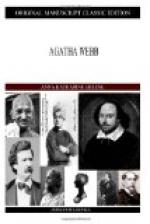Meanwhile Sweetwater had been witness to a series of pantomimic actions that interested him more than Amabel’s conduct under this final examination. Frederick, who had evidently some request to make or direction to give, had sent a written line to the coroner, who, on reading it, had passed it over to Knapp, who a few minutes later was to be seen in conference with Agnes Halliday. As a result, the latter rose and left the room, followed by the detective. She was gone a half-hour, then simultaneously with her reappearance, Sweetwater saw Knapp hand a bundle of letters to the coroner, who, upon opening them, chose out several which he proceeded to read to the jury. They were the letters referred to by Frederick as having been given to him by his mother. The first was dated thirty-five years previously and was in the handwriting of Agatha herself. It was directed to James Zabel, and was read amid a profound hush.
Dear James:
You are too presumptuous. When I let you carry me away from John in that maddening reel last night, I did not mean you to draw the inference you did. That you did draw it argues a touch of vanity in a man who is not alone in the field where he imagines himself victor. John, who is humbler, sees some merit in—well, in Frederick Snow, let us say. So do I, but merit does not always win, any more than presumption. When we meet, let it be as friends, but as friends only. A girl cannot be driven into love. To ride on your big mare, Judith, is bliss enough for my twenty years. Why don’t you find it so too? I think I hear you say you do, but only when she stops at a certain gate on Portchester highway. Folly! there are other roads and other gates, though if I should see you enter one—There! my pen is galloping away with me faster than Judith ever did, and it is time I drew rein. Present my regards to John—But no; then he would know I had written you a letter, and that might hurt him. How could he guess it was only a scolding letter, such as it would grieve him to receive, and that it does not count for anything! Were it to Frederick Snow, now— There! some horses are so hard to pull up—and so are some pens. I will come to a standstill, but not before your door.
Respectfully your neighbour,
Agatha Gilchrist.
Dear James:
I know I have a temper, a wicked temper, and now you know it too. When it is roused, I forget love, gratitude, and everything else that should restrain me, and utter words I am myself astonished at. But I do not get roused often, and when all is over I am not averse to apologising or even to begging forgiveness. My father says my temper will undo me, but I am much more afraid of my heart than I am of my temper. For instance, here I am writing to you again just because I raised my riding-whip and said—But you know what I said, and I am not fond of recalling the words, for I cannot




